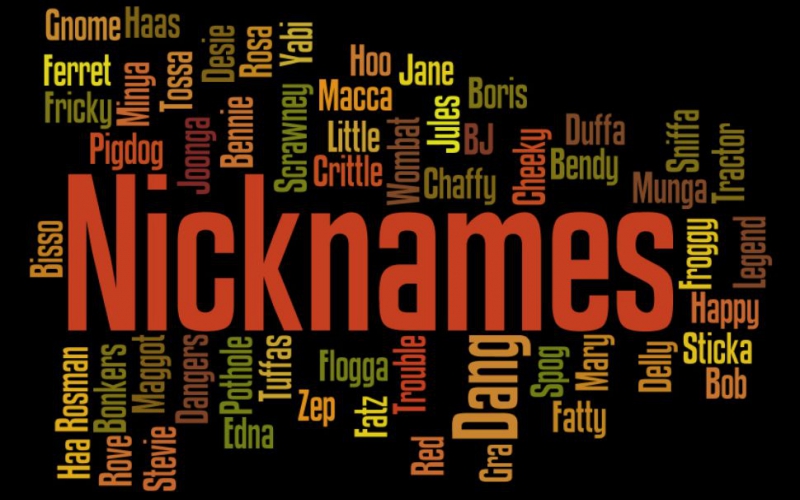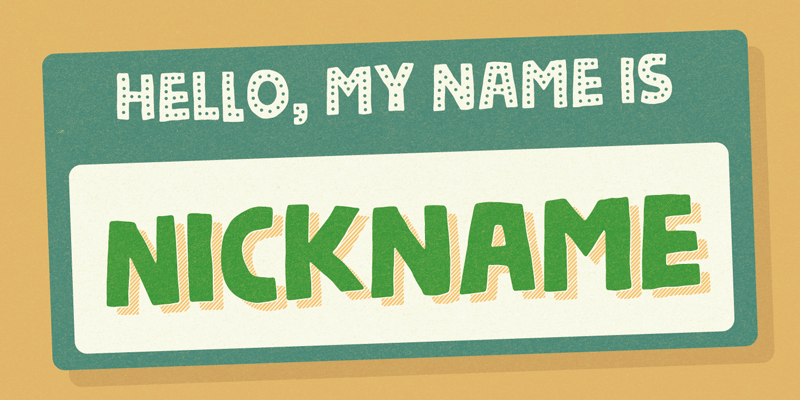Understanding “Sobriquet” and Its Usage

A sobriquet, also known as a nickname, is a name that is given to a person, place, or thing, often to distinguish them from others or to highlight a particular characteristic. The term “sobriquet” originates from the French word “sobrequet,” which means “sur-name” or “additional name.” Sobriquets can be humorous, affectionate, or even derogatory, depending on their intent and context.
Famous Sobriquets and Their Associations
Sobriquets have been used throughout history to identify and distinguish individuals. They can be based on a person’s physical appearance, personality, accomplishments, or even a memorable event. Here are some examples of famous sobriquets and the individuals they are associated with:
- “The Iron Duke”: Arthur Wellesley, 1st Duke of Wellington, a British military leader known for his stern demeanor and military victories.
- “The Bard”: William Shakespeare, an English playwright and poet widely regarded as the greatest writer in the English language.
- “The King”: Elvis Presley, an American singer, actor, and musician who revolutionized popular music and became a cultural icon.
- “The Great Emancipator”: Abraham Lincoln, the 16th President of the United States, known for his role in ending slavery in the country.
Nuances of Using a Sobriquet
Using a sobriquet can be a powerful way to shape a person’s reputation and identity. However, it’s important to consider the potential impact of a sobriquet before using it. Here are some key points to keep in mind:
- Positive or Negative Connotations: A sobriquet can either enhance or diminish a person’s reputation, depending on its connotations. For example, “The Iron Duke” suggests strength and determination, while “The Mad Hatter” implies eccentricity or even instability.
- Acceptance and Ownership: A sobriquet is most effective when it is embraced by the individual it refers to. If the individual rejects or dislikes the sobriquet, it may have a negative impact on their image.
- Context and Audience: The appropriateness of a sobriquet depends on the context and the audience. A sobriquet that is acceptable among friends may not be appropriate in a professional setting.
Synonyms and Alternatives for “Sobriquet”: Sobriquet Synonym

While “sobriquet” is a perfectly valid word, its somewhat formal tone and infrequent usage might make it unsuitable for all situations. Luckily, a variety of synonyms exist, each offering a slightly different shade of meaning and connotation.
Synonyms for “Sobriquet”
Understanding the nuances of these synonyms is crucial for choosing the most appropriate word for your context.
- Nickname: This is the most common and versatile synonym, suitable for informal and formal settings. It generally refers to a familiar, often playful name given to a person, place, or thing. For example, “The city’s nickname is ‘The Big Apple.'”
- Alias: This synonym suggests a false name used to conceal one’s identity, often associated with criminal activities or espionage. For instance, “The thief used an alias to escape detection.”
- Pseudonym: This term refers to a fictitious name used by an author or artist, often to protect their privacy or create a separate identity for their work. For example, “The author wrote under the pseudonym ‘J.K. Rowling.'”
- Moniker: This synonym is slightly more formal than “nickname” and carries a sense of distinctiveness or notoriety. For example, “The boxer was known by the moniker ‘Iron Mike.'”
- Epithet: This term refers to a descriptive phrase or adjective used to characterize a person or thing, often with a negative connotation. For example, “The king was known by the epithet ‘the Cruel.'”
Choosing the Right Synonym
The choice of synonym depends on the context and the intended effect.
- Informal settings: “Nickname” is generally the most appropriate choice.
- Formal settings: “Sobriquet,” “moniker,” or “pseudonym” might be more suitable depending on the specific situation.
- Negative connotations: “Epithet” is the most appropriate choice if you want to emphasize a negative characteristic.
- Concealing identity: “Alias” is the most appropriate choice when referring to a false name used to hide one’s identity.
Exploring the Contextual Use of Sobriquets

Sobriquets, those charming nicknames that add a touch of personality and intrigue, are more than just playful appellations. They are a fascinating window into the cultural and historical context in which they emerge. Examining how sobriquets are used across various spheres, from literature to popular culture, reveals their profound influence on shaping public perception and historical narratives.
The Use of Sobriquets in Literature and Art
Sobriquets have been a staple in literature and art, adding depth and nuance to characters and artistic expressions. Writers and artists have used sobriquets to:
- Enhance Character Development: Authors often use sobriquets to create memorable characters. For instance, in Shakespeare’s “Romeo and Juliet,” Romeo is known as “Romeo Montague,” but he’s also referred to as “Romeo” or “the star-crossed lover,” highlighting his romantic nature and tragic fate. Similarly, in “The Adventures of Huckleberry Finn,” Mark Twain uses “Huckleberry Finn” and “Huck” interchangeably, showcasing Huck’s mischievous and independent spirit.
- Create Symbolic Meanings: Sobriquets can also serve as symbols, representing a character’s personality, beliefs, or even their place in society. For example, in “The Scarlet Letter,” Hester Prynn’s scarlet “A” becomes a powerful symbol of her sin and her enduring strength.
- Elevate Artistic Expressions: Artists, including painters, sculptors, and musicians, have often used sobriquets to create unique artistic identities. For example, Pablo Picasso, known as “Picasso,” transcended his birth name to become synonymous with his innovative artistic style.
The Impact of Sobriquets on Public Perception and Historical Narratives
Sobriquets can shape how individuals and events are remembered, influencing public perception and historical narratives. Here are some key ways:
- Amplifying Public Recognition: Sobriquets can elevate individuals to a higher level of public recognition, transforming them into cultural icons. For instance, “The King of Rock and Roll” is a sobriquet that has immortalized Elvis Presley, solidifying his place in music history.
- Defining Historical Figures: Sobriquets can be used to define historical figures, highlighting their key characteristics or achievements. For example, “The Great Emancipator” is a sobriquet associated with Abraham Lincoln, emphasizing his role in ending slavery in the United States.
- Shaping Historical Narratives: Sobriquets can also influence historical narratives, often reflecting the prevailing societal attitudes and beliefs. For instance, “The Iron Lady” is a sobriquet used to describe Margaret Thatcher, highlighting her strong and uncompromising leadership style.
Categorizing Different Types of Sobriquets, Sobriquet synonym
Sobriquets can be categorized based on their origins and meanings, providing insights into their cultural and historical contexts.
| Type | Origin | Meaning | Examples |
|---|---|---|---|
| Descriptive | Based on physical attributes or personality traits | Describes the individual’s characteristics | “The Great” (Alexander the Great), “The Bald” (Charles the Bald) |
| Place-Based | Based on the individual’s place of origin or residence | Identifies the individual’s geographic location | “The Conqueror” (William the Conqueror), “The Texan” (Lyndon B. Johnson) |
| Occupation-Based | Based on the individual’s profession or trade | Reflects the individual’s work | “The Shoemaker” (John the Shoemaker), “The Carpenter” (Joseph the Carpenter) |
| Event-Based | Based on a significant event or achievement | Commemorates a particular event | “The Liberator” (Simon Bolivar), “The Architect of Modern China” (Deng Xiaoping) |
| Humorous | Based on a playful or ironic observation | Adds a lighthearted touch | “The Bard” (William Shakespeare), “The Man of Steel” (Superman) |